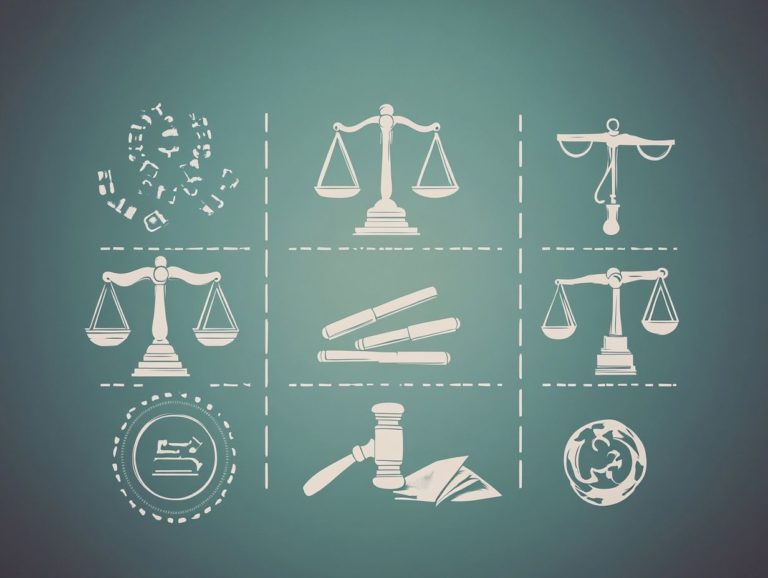The Consequences of Cyberbullying
In today s increasingly digital world, the rise of cyberbullying is a pressing issue that impacts individuals of all ages. Join us on a journey to uncover how cyberbullying affects lives and what we can do to fight back!
This article unpacks the various facets of cyberbullying, starting with its definition and types to provide a comprehensive understanding of its scope.
You ll discover the profound mental and emotional effects on victims, along with the academic and social consequences that can arise. Learn how to identify the signs of cyberbullying, explore strategies for prevention, and understand the steps to take if you find yourself affected.
We also explore the legal aspects surrounding cyberbullying, shedding light on the laws and penalties associated with this critical topic. Navigate with us through the complex landscape of cyberbullying and its far-reaching consequences.
Contents
- Key Takeaways:
- Understanding Cyberbullying
- Effects of Cyberbullying on Victims
- Academic and Social Consequences
- Identifying Cyberbullying
- Signs and Behaviors to Look Out For
- Preventing Cyberbullying
- Strategies for Parents, Educators, and Peers
- Dealing with Cyberbullying
- Legal Consequences of Cyberbullying
- Frequently Asked Questions
- What is cyberbullying and what are its consequences?
- How does cyberbullying affect mental health?
- Can cyberbullying impact academic performance?
- What are the potential legal consequences of cyberbullying?
- Can bystanders also face consequences for cyberbullying?
- What can be done to prevent or stop cyberbullying?
Key Takeaways:

Cyberbullying can have serious mental, emotional, academic, and social consequences for victims, making it a serious issue that needs to be addressed.
It is important to identify signs and behaviors of cyberbullying to prevent and deal with it effectively. Parents, educators, and peers can play a crucial role in preventing cyberbullying by implementing strategies and creating a supportive environment for victims.
Understanding Cyberbullying
Understanding cyberbullying is imperative in today s digital landscape, where intentional bullying can manifest through multiple channels, like social media and messaging apps.
Research from experts like Joseph Magliano underscores the urgency of recognizing cyberbullying as a pressing issue that profoundly impacts countless adolescents. This often results in significant emotional trauma and adverse outcomes for both victims and perpetrators.
By discerning its diverse forms and implications, we empower parents, educators, and communities to effectively tackle and prevent this escalating concern, fostering a safer online environment for everyone involved.
Definition and Types of Cyberbullying
Cyberbullying is characterized by repeated aggressive acts carried out through digital communication, intentionally inflicting harm on victims. This often emerges as online threats or instances of harassment.
You may encounter various forms of this behavior, including harassment, defamation, and public disclosure, each bearing distinct implications for the victim.
- Harassment: Typically involves sending relentless, unwanted messages that foster a hostile online environment.
- Defamation: Revolves around disseminating false information that tarnishes an individual s reputation, a phenomenon often seen in viral posts or comments.
- Public Disclosure: Entails sharing sensitive information without consent, compounding the vulnerability experienced by victims.
The emotional toll on those targeted can be staggering, leading to anxiety, depression, and even suicidal thoughts. Grasping these nuances is crucial, especially considering the legal repercussions that can arise under harassment laws.
Effects of Cyberbullying on Victims
The effects of cyberbullying on individuals can be both profound and complex, often creating emotional and psychological impacts that ripple far beyond the digital sphere.
You may find yourself grappling with diminished self-esteem, depression, and anxiety, which can ultimately manifest as serious health issues.
Research has shown that these repercussions can translate into poor academic performance, making it challenging to maintain your grades and potentially leading to increased absenteeism due to the emotional strain that cyberbullying inflicts.
Mental and Emotional Impact
Victims of cyberbullying often face profound mental and emotional consequences, translating into long-lasting psychological impacts, such as depression and anxiety.
Research indicates that these individuals may develop anxiety disorders, marked by persistent feelings of fear or worry, frequently intensified by online harassment.
Studies reveal that the unrelenting nature of digital communication can deepen feelings of isolation, making it increasingly difficult for victims to reach out for support.
A thorough analysis conducted by the Cyberbullying Research Center underscores that those targeted often experience diminished self-esteem and heightened distress. This highlights the critical importance of nurturing supportive relationships to counteract the harmful effects of cyberbullying, reinforcing the necessity for mental health resources and open dialogues that promote resilience and healing.
Academic and Social Consequences

The academic and social consequences of cyberbullying are significant. This often leads you to skip school, resulting in poor grades and strained relationships with peers and family, as detailed in the rise of cyberbullying: causes and effects.
This distress creates a vicious cycle where falling behind academically isolates you even further. It makes it increasingly difficult to engage with fellow students and the learning environment.
Social media amplifies this detachment, serving as a platform for continuous harassment. It showcases the relentless nature of virtual torment that can invade your life outside of school hours.
Parents and educators play a critical role in reducing these damaging effects. By fostering open communication, promoting a supportive atmosphere, and implementing effective anti-bullying policies, they can create safer spaces for all students.
Encouraging positive interactions on social media can help rebuild the confidence of those affected. This aids in reintegrating them into school life.
Identifying Cyberbullying
Spotting cyberbullying early makes a real difference! Recognizing the signs and behaviors of both victims and bullies empowers parents and educators to take timely action.
Look for common indicators such as changes in emotional state, withdrawal from social interactions, and noticeable signs of distress. Watch for shifts in academic performance as well.
Keeping an eye on online activities regularly allows parents to spot potential cyberbullying situations before they escalate. This helps prevent emotional trauma for the victim.
Signs and Behaviors to Look Out For
Recognizing the signs of a cyber victim is essential for effective intervention. You might notice sudden emotional shifts or withdrawal from social activities.
Be attentive to indicators such as increased anxiety, visible signs of depression, or a noticeable decline in self-esteem. These symptoms reveal the emotional toll that cyberbullying takes.
If a child displays aggressive behaviors or becomes fixated on digital devices, they may be engaging in cyberbullying themselves. Understanding these dynamics allows you to address issues proactively.
Preventing Cyberbullying
Preventing cyberbullying requires teamwork from parents, educators, and community members. Together, we can cultivate a culture of bullying prevention and safe online practices.
Implementing strategies that enhance awareness and understanding of this critical issue helps create a supportive environment for all young individuals. Your role as a parent in monitoring online behavior and encouraging open communication is crucial.
Strategies for Parents, Educators, and Peers
Effective strategies for parents, educators, and peers in combating cyberbullying include fostering a safe environment and prioritizing open communication.
Establishing strong support systems that involve family members, schools, and community organizations enhances these strategies.
By actively monitoring children s online activities, you create a collaborative approach that ensures young individuals feel comfortable discussing their experiences.
Community initiatives like workshops can educate everyone involved on the implications of cyberbullying and the importance of collective action.
Resources such as hotlines and counseling services are invaluable for immediate assistance. Collaborating with local authorities can help foster a safer online environment for all.
Dealing with Cyberbullying

Dealing with cyberbullying effectively requires you to understand the essential steps to take if you or someone you know falls victim. Establishing a safe environment is crucial for recovery and support.
By reporting incidents and making a plan to heal emotionally, you can significantly lessen the emotional trauma experienced by victims. Understanding the rules that protect people from online bullying gives you the power to take appropriate actions, ensuring that you re equipped to handle the situation with confidence and clarity.
Steps to Take if You’re Being Cyberbullied
If you find yourself facing the unfortunate reality of cyber victimization, it s essential to take immediate steps to protect yourself and initiate the healing process. This includes seeking out support systems and familiarizing yourself with cyberbullying laws.
Start by keeping records of the bullying screenshots, messages, or emails. This information can prove very useful should you decide to pursue legal action. Don t hesitate to reach out to trusted friends or family; their emotional support can provide a much-needed sense of community during this challenging period.
Understand your rights under local cyberbullying laws, as this knowledge can empower you to take the necessary steps forward. Consider mental health resources, such as counseling or support groups, which are vital for helping you cope with the emotional trauma and rebuild your self-esteem.
Legal Consequences of Cyberbullying
The legal consequences of cyberbullying are substantial, encompassing a range of harassment laws designed to impose penalties on offenders while safeguarding victims under the framework of cyberbullying legislation.
Grasping these legal repercussions is essential, whether you are a victim seeking justice or someone engaging in harmful online behavior.
It’s important to recognize that different jurisdictions enforce varying measures against criminal harassment and related offenses, highlighting the need for awareness and responsibility in the digital landscape.
Laws and Penalties for Cyberbullying
Cyberbullying laws differ from one jurisdiction to another, but they typically impose serious legal consequences for anyone found guilty of harassment or related offenses. These regulations aim not only to deter potential offenders but also to offer a sense of security to victims, who often endure significant emotional and psychological distress.
In places like the United States, numerous states have implemented specific laws targeting online harassment, while Europe tends to emphasize broader community safety regulations that address digital behavior. The penalties can vary widely, ranging from fines and community service to imprisonment, depending on the severity of the offense.
For victims, these laws highlight their right to a safe online environment, while offenders may face grave repercussions that can impact their future. Raising awareness about these laws is essential; it gives individuals the power to recognize and report cyberbullying, fostering a more supportive and informed digital community.
Frequently Asked Questions
What is cyberbullying and what are its consequences?

Cyberbullying is when someone uses technology to bully or harass others. The consequences can include mental health issues, academic struggles, and even legal repercussions.
How does cyberbullying affect mental health?
Cyberbullying can have severe effects on mental health, causing feelings of depression, anxiety, and isolation. It can also lead to low self-esteem and thoughts of self-harm.
Can cyberbullying impact academic performance?
Yes, cyberbullying can significantly impact academic performance. It can cause a lack of concentration, absenteeism, and a decline in grades.
What are the potential legal consequences of cyberbullying?
Cyberbullying can result in legal consequences, such as charges for harassment, cyberstalking, or even hate crimes. Depending on the severity of the bullying, it can also lead to civil lawsuits and fines.
You are not alone; help is available! Taking action quickly can make a big difference!
Can bystanders also face consequences for cyberbullying?
Yes, bystanders who participate in or encourage cyberbullying can also face consequences. They can be held accountable for their actions and face legal consequences, especially if the bullying harms the victim.
What can be done to prevent or stop cyberbullying?
Educating people about cyberbullying is crucial to prevention.
Parents, teachers, and friends must stay alert and step in whenever they notice bullying.
If you’re a victim, tell a trusted adult and report the bullying right away.





